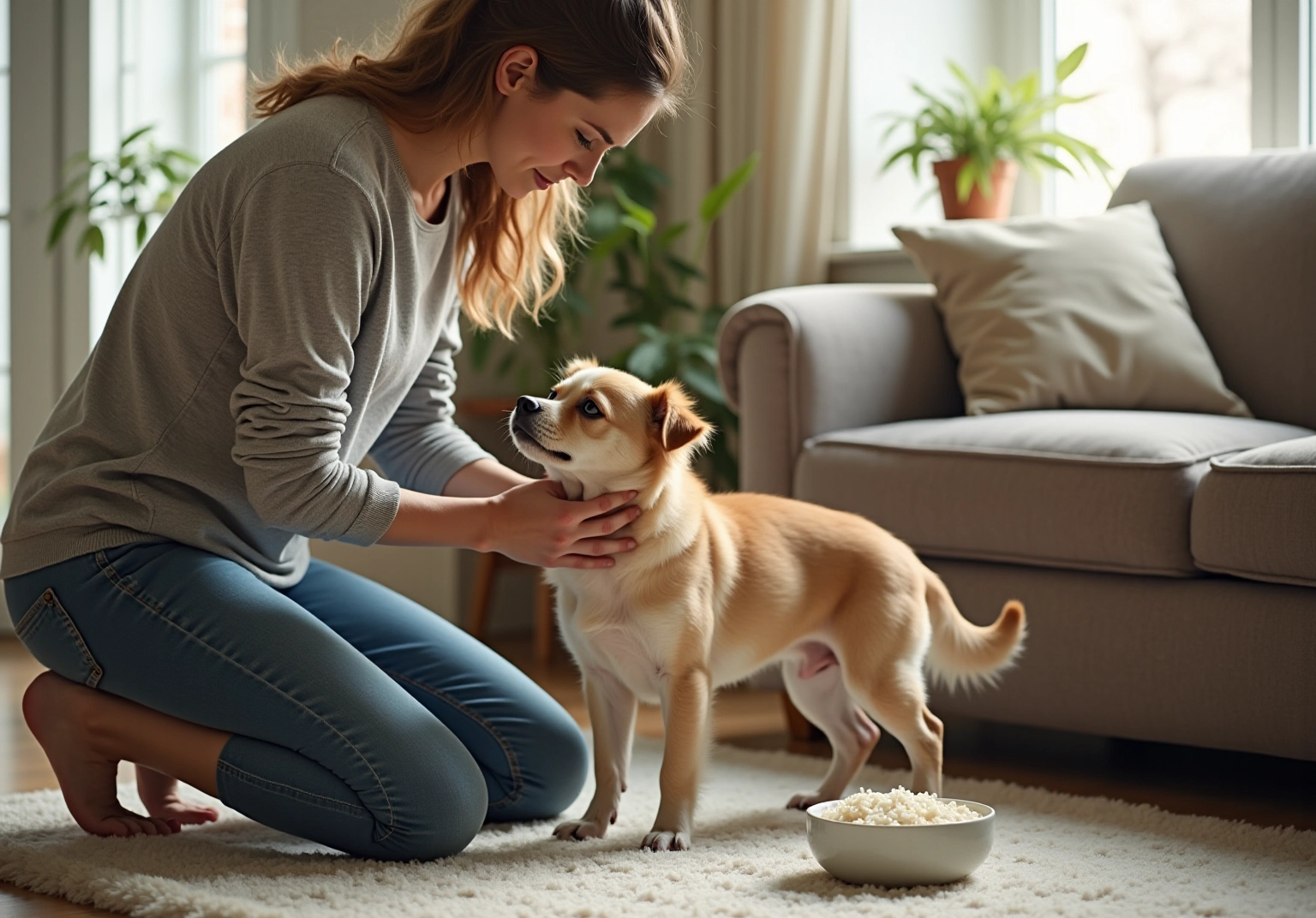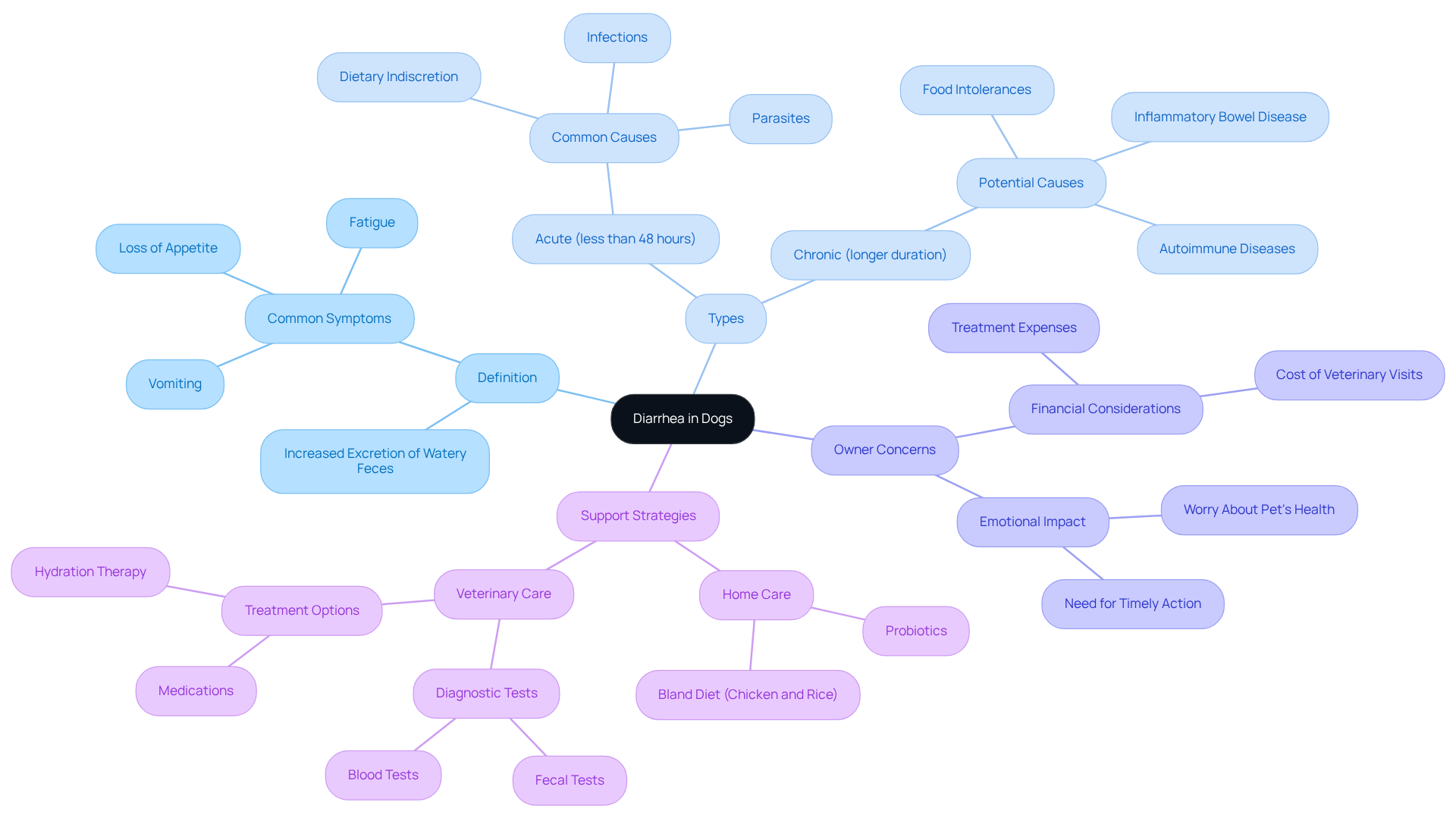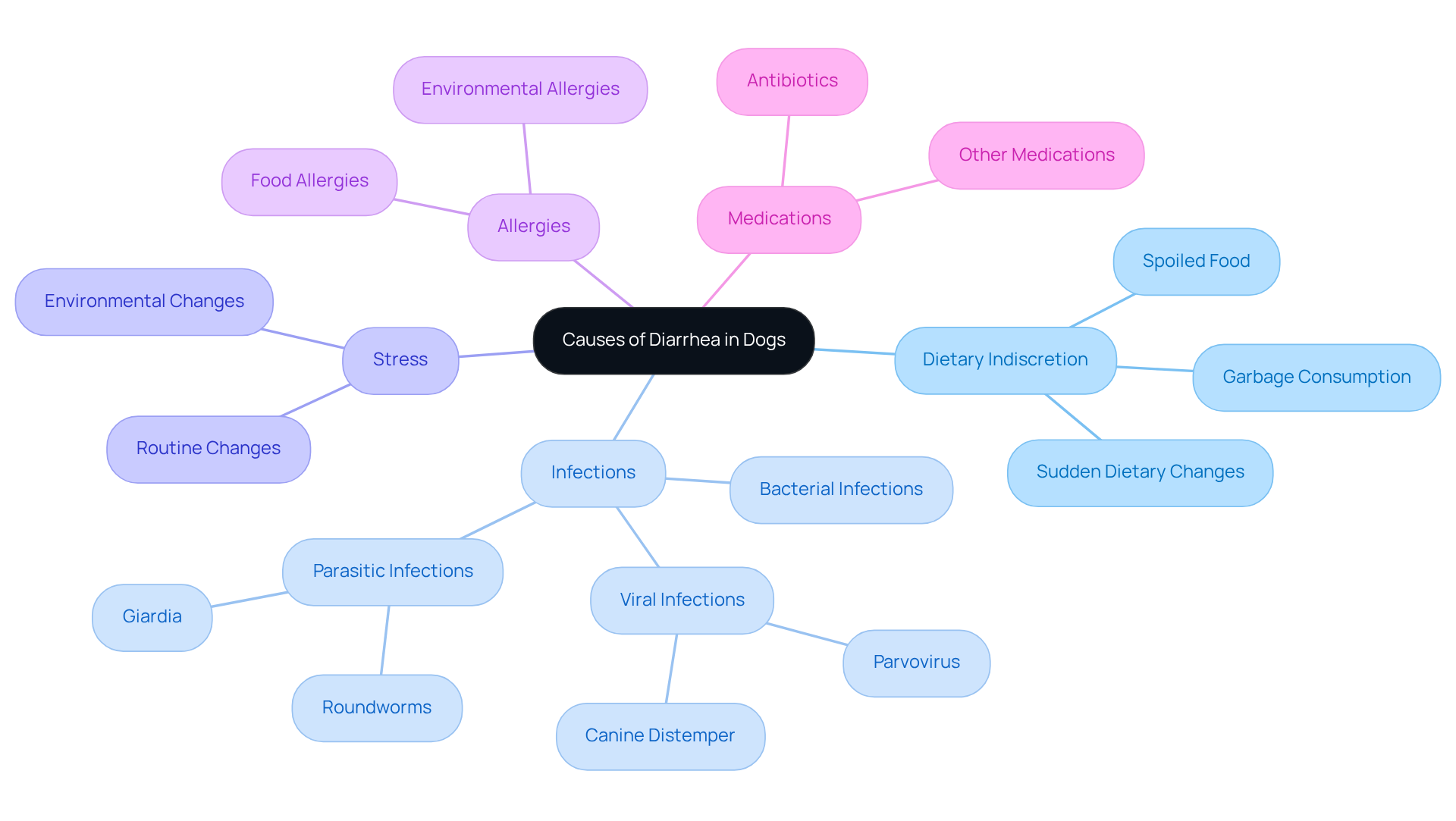
Diarrhea in Dogs: Causes, Symptoms, and Home Management Tips
Overview
Diarrhea in dogs can be a distressing experience for pet owners, often stemming from various factors such as:
- Dietary indiscretion
- Infections
- Stress
- Allergies
- Certain medications
It can present itself in both acute and chronic forms, which can be overwhelming to navigate. Acknowledging these concerns, it’s essential to recognize the symptoms and understand how to manage mild cases at home. However, knowing when to seek veterinary care is equally important, as this ensures that you are well-equipped to support your dog’s health effectively.
As a caring pet owner, your instincts to protect and nurture your furry companion are commendable. The emotional toll of worrying about your pet’s well-being can be significant, and it’s crucial to remember that you are not alone in this journey. Many pet owners face similar challenges, and there are resources available to help guide you through this process. By staying informed and prepared, you can make the best decisions for your dog’s care, fostering a sense of security and comfort for both you and your beloved pet.
Introduction
Understanding diarrhea in dogs is essential for every pet owner. This common issue can be distressing, often signaling underlying health problems that may affect your furry friend’s comfort and well-being. As a caring pet parent, it’s natural to worry about your dog during such challenging times.
By exploring the causes, symptoms, and effective home management strategies, you can gain valuable insights to support your beloved companion. However, it’s important to ask: when does a simple upset stomach become a serious health concern that requires professional intervention?
Your awareness and proactive approach can make all the difference in ensuring your dog remains happy and healthy.
Define Diarrhea in Dogs: Understanding the Basics
Diarrhea in dogs can be a distressing experience for both the canines and their owners. It is characterized by loose, watery stools that occur more frequently than usual. While diarrhea itself is not a disease, it can signal various underlying issues that may be affecting your beloved pet’s health. Understanding this condition is crucial, as it can manifest in two forms:
- Acute, lasting less than 48 hours
- Chronic, persisting for a longer period
As a pet owner, it’s natural to feel concerned when your furry friend is unwell. The sight of loose stools can evoke worry about their well-being. Recognizing the signs of diarrhea in dogs and grasping the fundamentals of loose stools can empower you to monitor your dog’s health effectively. This knowledge not only helps you take suitable action when needed but also provides peace of mind during a stressful time.
If your dog is experiencing diarrhea, remember that you are not alone in this journey. Many pet owners face similar challenges, and it’s important to know that there are compassionate solutions available. By staying informed and seeking guidance, you can ensure that your dog receives the care they need to recover and thrive. Your commitment to their health is a testament to the love you share, and together, you can navigate through these difficult moments.

Identify Causes of Diarrhea: Common Triggers and Health Concerns
As pet owners, we often find ourselves deeply concerned about our furry friends, especially when they experience gastrointestinal issues like diarrhea. Understanding the common causes of diarrhea in dogs can help us feel more empowered in managing our pets’ health and well-being.
One of the most frequent culprits is dietary indiscretion. This occurs when dogs consume spoiled food, garbage, or undergo sudden dietary changes. As Mimi Padmabandu insightfully notes, “Simply put, dietary indiscretion refers to any time your dog eats something they shouldn’t—including garbage, table scraps, or non-food items.” While mild cases may resolve on their own within a few days, severe instances can lead to dehydration and other complications, necessitating veterinary care. It’s important to keep a watchful eye on what our pets are eating to avoid these situations.
Infections are another significant concern when considering diarrhea in dogs. Bacterial, viral, or parasitic infections can cause diarrhea in dogs by severely disrupting their gastrointestinal tract. For instance, Giardia is a prevalent infectious agent, implicated in about 11% of chronic bowel issues. Other diseases, such as parvovirus and canine distemper, pose critical risks, particularly for unvaccinated dogs and puppies. Recognizing the signs of infection early can make a world of difference in our pets’ recovery, particularly in cases of diarrhea in dogs.
Stress can also contribute to gastrointestinal upset, which may lead to diarrhea in dogs. Changes in a dog’s environment or routine, such as moving to a new home or shifts in family dynamics, can lead to anxiety and discomfort. It’s not uncommon for our pets to feel overwhelmed during these transitions, and being mindful of their emotional state is crucial.
Allergies, particularly food allergies or intolerances, can cause significant gastrointestinal distress. These may be accompanied by other symptoms, such as itching or skin inflammation. Identifying specific allergens often requires dietary trials under the guidance of a pet specialist. Taking the time to understand our pets’ unique needs can foster a healthier and happier life for them.
Lastly, certain medications, especially antibiotics, can upset the digestive system, leading to loose stools. If you notice gastrointestinal disturbances after administering medication, it’s essential to consult with your veterinarian. They can provide guidance on how to manage these side effects effectively.
By recognizing these triggers, we can better manage our dogs’ diets and environments, ensuring that we take prompt action when necessary. Our pets rely on us for their care, and being informed allows us to provide the best support possible.

Recognize Symptoms: When to Seek Veterinary Care
As a pet owner, witnessing your furry friend struggle can be heart-wrenching. Symptoms accompanying diarrhea that warrant veterinary attention include:
- Persistent diarrhea lasting more than 24-48 hours, which can lead to dehydration and other serious health issues.
- Blood in the stool, which is a significant indicator of potential internal problems and should never be ignored.
- Vomiting, especially when it occurs alongside diarrhea, can exacerbate dehydration risks.
- Lethargy—a noticeable decrease in energy or activity levels—can signal underlying health concerns.
- A loss of appetite, such as refusal to eat for more than a day, may indicate a serious condition.
- Signs of dehydration, like dry gums, sunken eyes, or excessive thirst, are critical signs that require immediate veterinary care.
Veterinarians stress that untreated intestinal issues can result in serious complications, including hospitalization for intravenous fluid therapy. For instance, a situation concerning a 13-year-old miniature Yorki/Pom highlighted the urgency of addressing dark brown stool with blood, as it indicated a serious condition requiring prompt intervention. If you notice any of these symptoms in your beloved pet, it is crucial to consult a veterinarian promptly. Your pet’s health and safety are paramount, and taking swift action can make all the difference in their well-being.
Manage Diarrhea at Home: Practical Tips and Remedies
Managing mild diarrhea in dogs can be a concerning experience, but there are compassionate strategies you can implement at home to help ease their discomfort.
- Fasting: Consider withholding food for 12 to 24 hours. This allows your dog’s gastrointestinal tract to rest, reducing irritation and promoting recovery. It’s natural to worry during this time, but giving their system a break can be beneficial.
- Hydration: It’s crucial to ensure your dog has constant access to fresh water to prevent dehydration. Offering rice water can be particularly soothing and hydrating, aiding in their recovery while providing comfort.
- Bland Diet: After the fasting period, you can gradually introduce a bland diet consisting of plain boiled chicken and white rice. This gentle approach helps ease your dog’s digestive system back to normal. You can typically reintroduce regular food over a period of seven to ten days, allowing their stomach to adjust.
- Probiotics: Incorporating probiotics can assist in restoring healthy gut flora. It’s always advisable to consult your veterinarian for specific recommendations tailored to your dog’s needs, ensuring they receive the best care possible.
- Monitoring: Keep a close watch on your dog’s condition. If gastrointestinal upset continues for more than a few days or intensifies, obtaining veterinary assistance is crucial to exclude any serious underlying problems. Your vigilance can make a significant difference in their well-being.
These home treatments can be useful in addressing mild digestive issues, such as diarrhea in dogs, but always remember to check with your veterinarian if you have any concerns about your dog’s health. Your love and attention are the best medicine for your furry friend.
Consult a Veterinarian: Understanding When Professional Help is Needed
If your beloved dog is experiencing any health issues, it’s crucial to consult a veterinarian. Consider reaching out if:
- Diarrhea persists for more than 48 hours, as prolonged diarrhea can lead to dehydration and other serious health issues.
- Your dog shows signs of severe dehydration or lethargy, which may indicate a more serious underlying condition.
- You notice blood in the stool or black, tarry stools, as these can signal significant gastrointestinal distress or bleeding.
- Accompanying symptoms such as vomiting, fever, or abdominal pain arise, which may suggest a more severe illness requiring immediate attention.
- Your dog is very young, old, or has pre-existing health conditions, as these factors increase vulnerability to complications.
Seeking prompt assistance is essential; research shows that timely animal care can greatly enhance outcomes for canines facing diarrhea in dogs and other digestive issues. For instance, over 80% of instances of diarrhea in dogs did not necessitate a second veterinary visit, indicating that most dogs respond positively to immediate treatment. Delaying veterinary consultation can lead to further complications, including severe dehydration and prolonged discomfort, which may escalate into life-threatening conditions such as hemorrhagic gastroenteritis (HGE). As Dr. Shea Cox wisely notes, “It’s important to consult a veterinarian to determine the exact cause and appropriate treatment.” If your dog exhibits persistent symptoms or any of the signs mentioned, reaching out for professional help is essential to ensure their health and well-being.
Conclusion
Understanding diarrhea in dogs is essential for pet owners who want to ensure their furry companions remain healthy and comfortable. This condition, while common, can signal underlying health issues that deserve careful attention. By grasping the various causes and symptoms of diarrhea, along with implementing effective home management strategies, owners can take proactive steps to support their pets’ recovery and well-being.
Common triggers of diarrhea include:
- Dietary indiscretion
- Infections
- Stress
- Allergies
Recognizing symptoms that require veterinary care is equally important, as timely intervention can prevent complications. Practical home management tips, such as fasting, hydration, and introducing a bland diet, provide vital support during mild episodes. However, knowing when to seek professional help is crucial to safeguarding your dog’s health.
Ultimately, being an informed pet owner means being ready to act swiftly and compassionately when your dog faces gastrointestinal distress. By applying the insights gained from this article, your commitment to your dog’s health can shine through, ensuring they receive the best care possible. Staying vigilant and responsive to your pet’s needs not only fosters their recovery but also strengthens the bond of trust and love shared between you and your furry friend.
